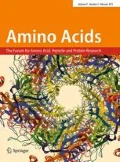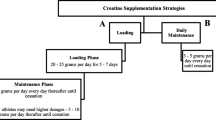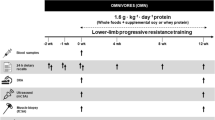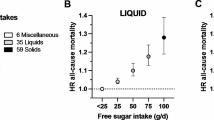Abstract
Studies have examined adding protein to carbohydrate–electrolyte rehydration drinks, but the effects of protein in isolation remain unknown. Ten subjects completed two trials in which they were dehydrated (~2 % of pre-exercise body mass) by intermittent cycling in the heat. Subjects then rehydrated (150 % total mass loss) over 1 h with mineral water (W) or mineral water plus 20 g L−1 whey protein isolate (WP) and remained in the laboratory for a further 4 h. Blood and urine samples were provided pre-exercise, post-exercise, post-rehydration and every hour thereafter. From blood samples, serum osmolality, change in plasma volume and plasma albumin content was determined, whilst the volume and osmolality of urine samples were determined. There was no difference between trials for total urine volume [W: 1,234 (358) mL; WP: 1,306 (268) mL; P = 0.409], drink retention [W: 40 (14) %; WP: 37 (14) %; P = 0.322] or net fluid balance [W: −605 (318) mL; WP: −660 (274) mL; P = 0.792] 4-h post-rehydration. Plasma volume was greater 3 and 4 h post-drinking during WP, and plasma albumin content relative to pre-exercise was increased 1–4 h post-drinking in WP only. These results suggest that addition of 20 g L−1 whey protein isolate neither enhances nor inhibits post-exercise rehydration, when a volume equivalent to 150 % of sweat losses is ingested in 1 h. As post-exercise nutritional requirements are multifactorial (rehydration, glycogen resynthesis, myofibrillar/mitochondrial protein synthesis), these data demonstrate that when post-exercise protein intake might benefit recovery or adaptation, this can be achieved without compromising rehydration.






Similar content being viewed by others
References
Calbet JAL, MacLean DA (1997) Role of caloric content on gastric emptying in humans. J Physiol 498(2):553–559
Clayton DJ, Evans GE, James LJ (2013) Effect of hypotonic and hypertonic glucose-electrolyte drinks on gastric emptying and drink retention after exercise in the heat. Int J Sport Nutr Exerc Metab. In Press
Dill D, Costill DL (1974) Calculation of percentage changes in volumes of blood, plasma, and red cells in dehydration. J Appl Physiol 37:247–248
Evans GH, Shirreffs SM, Maughan RJ (2009) Postexercise rehydration in man: the effects of osmolality and carbohydrate content of ingested drinks. Nutrition 25:905–913
Evans GH, Shirreffs SM, Maughan RJ (2011) The effects of repeated ingestion of high and low glucose-electrolyte drinks on gastric emptying and blood 2H2O concentration after an overnight fast. Br J Nutr 106:1732–1739
Faul F, Erdfield E, Buchner A, Lang AG (2009) Statistical power analyses using G*Power 3.1: tests for correlation and regression analyses. Behav Res Methods 41:1149–1160
Ferguson-Stegall L, McCleave E, Ding Z, Doerner Iii PG, Liu Y, Wang B, Healy M, Kleinart M, Dessard B, Lassiter DG, Kammer L, Ivy JL (2011) Aerobic exercise training adaptations are increased by post-exercise carbohydrate-protein supplementation. J Nutr Metab 2011:623182
Francesconi RP, Sawka MN, Hubbard RW, Mager M (1983) Acute albumin-induced plasma volume expansion and exercise in the heat: effects on hormonal response in men. Eur J Appl Physiol Occup Physiol 51:121–128
Hall WL, Millward DJ, Long SJ, Morgan LM (2003) Casein and whey exert different effects on plasma amino acid profiles, gastrointestinal hormone secretion and appetite. Br J Nutr 89:239–248
Harriss DJ, Atkinson G (2011) Update—ethical standards in sport and exercise research. Int J Sports Med 32:819–821
Hartman JW, Tang JE, Wilkinson SB, Tarnopolski MA, Lawrence RL, Fullerton AV, Phillips SM (2007) Fat-free fluid milk after resistance exercise promotes greater lean mass accretion than does consumption of soy or carbohydrate in young, novice, male weightlifters. Am J Clin Nutr 86:373–381
James LJ, Clayton D, Evans GE (2011) Effect of milk protein addition to a carbohydrate-electrolyte rehydration solution ingested after exercise in the heat. Br J Nutr 105:393–399
James LJ, Gingell R, Evans GH (2012) Effect of whey protein addition to a carbohydrate-electrolyte rehydration solution ingested after exercise in the heat. J Athl Train 47:61–66
James LJ, Evans GE, Madin J, Scott D, Stepney M, Harris R, Stone R, Clayton D (2013) Effect of varying the concentrations of carbohydrate and milk protein in rehydration solutions ingested after exercise in the heat protein addition to a carbohydrate-electrolyte rehydration solution ingested after exercise in the heat. Br J Nutr 110:1285–1291
Jones EJ, Bishop PA, Green JM, Richardson MT (2010) Effects of metered versus bolus water consumption on urine production and rehydration. Int J Sport Nutr Exerc Metab 20:139–144
Kenefick RW, Cheuvron SN, Palombo LJ, Ely BR, Sawka MN (2010) Skin temperature modifies the impact of hypohydration on aerobic performance. J Appl Physiol 109:79–86
Maughan RJ, Leiper JB (1995) Sodium intake and post-exercise rehydration in man. J Appl Physiol 77:311–319
Merson SJ, Maughan RJ, Shirreffs SM (2008) Rehydration with drinks differing in sodium concentration and recovery from moderate exercise-induced hypohydration in man. Eur J Appl Physiol 103:585–594
Minshull C, James L (2013) The effects of hypohydration and fatigue on neuromuscular activation performance. Appl Physiol Nutr Metab 38:21–26
Moore DR, Robinson MJ, Fry JL, Tang JE, Glover EI, Wilkinson SB, Prior T, Tarnopolski MA, Phillips SM (2009) Ingested protein dose response of muscle and albumin protein synthesis after resistance exercise in young men. Am J Clin Nutr 89:161–168
Nose H, Mack GW, Shi XR, Nadel ER (1988) Role of osmolality and plasma volume during rehydration in humans. J Appl Physiol 65:325–331
Okazaki K, Hayase H, Ichinose T, Mitono H, Doi T, Nose H (2009) Protein and carbohydrate supplementation after exercise increases plasma volume and albumin content in older and young men. J Appl Physiol 107:770–779
Osterberg KL, Pallardy SE, Johnson RJ, Horswill CA (2010) Carbohydrate exerts a mild influence on fluid retentionfollowing exercise-induced dehydration. J Appl Physiol 108:245–250
Robinson MM, Turner SM, Hellerstein MK, Hamilton KL, Miller BF (2011) Long-term synthesis rates of skeletal muscle DNA and protein are higher during aerobic training in older humans than in sedentary young subjects but are not altered by protein supplementation. FASEB J 25:3240–3249
Sawka MN, Burke LM, Eichner ER, Maughan RJ, Montain SJ, Stachenfeld NS (2007) Exercise and fluid replacement. Med Sci Sports Exerc 39:377–390
Seifert J, Harmon J, DeClercq P (2006) Protein added to a sports drink improves fluid retention. Int J Sport Nutr Exerc Metab 16:420–429
Shirreffs SM, Maughan RJ (1998) Volume repletion after exercise-induced volume depletion in humans: replacement of water and sodium losses. Am J Physiol 274:F868–F875
Shirreffs SM, Taylor AJ, Leiper JB, Maughan RJ (1996) Post-exercise rehydration in man: effects of volume consumed and drink sodium content. Med Sci Sports Exerc 28:1260–1271
Shirreffs SM, Armstrong LE, Cheuvront SN (2004) Fluid and electrolyte needs for preparation and recovery from training and competition. J Sports Sci 22:57–63
Shirreffs SM, Aragon-Vargas LF, Kell M, Love TD, Phillips S (2007a) Rehydration after exercise in the heat: a comparison of 4 commonly used drinks. Int J Sport Nutr Exerc Metab 17:244–258
Shirreffs SM, Watson P, Maughan RJ (2007b) Milk as an effective post-exercise rehydration drink. Br J Nutr 98:173–180
Vist GE, Maughan RJ (1994) Gastric emptying of ingested solutions in man: effect of beverage glucose concentration. Med Sci Sports Exerc 26:1269–1273
Watson P, Love TD, Maughan RJ, Shirreffs SM (2008) A comparison of the effects of milk and a carbohydrate-electrolyte drink on the restoration of fluid balance and exercise capacity in a hot, humid environment. Eur J Appl Physiol 104:633–642
Wilkinson SB, Phillips SM, Atherton PJ, Patel R, Yarasheski KE, Tarnopolski MA, Rennie MJ (2008) Differential effects of resistance and endurance exercise in the fed state on signalling molecule phosphorylation and protein synthesis in human muscle. J Physiol 586:3701–3717
Acknowledgments
Funding for this study was received from Volac International Ltd.
Conflict of interest
The authors report no other conflict of interests.
Author information
Authors and Affiliations
Corresponding author
Rights and permissions
About this article
Cite this article
James, L.J., Mattin, L., Aldiss, P. et al. Effect of whey protein isolate on rehydration after exercise. Amino Acids 46, 1217–1224 (2014). https://doi.org/10.1007/s00726-014-1680-8
Received:
Accepted:
Published:
Issue Date:
DOI: https://doi.org/10.1007/s00726-014-1680-8




